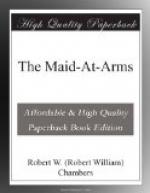When Mount and Elerson had finished the shallow grave, they laid the scalps of the murdered in the hole, stamped down the earth, and covered it with sticks and branches lest a prowling outlaw or Seneca disinter the remains and reap a ghastly reward for their redemption from General the Hon. Barry St. Leger, Commander of the British, Hessians, Loyal Colonials, and Indians, in camp before Fort Stanwix.
As we left that dreadful spot, and before I could interfere to prevent them, the three riflemen emptied their pieces into the swinging corpse—a useless, foolish, and savage performance, and I said so sharply.
They were very docile and contrite and obedient now, explaining that it was a customary safeguard, as hanged men had been revived more than once—a flimsy excuse, indeed!
“Very well,” I said; “your shots may draw McCraw’s whole force down on us. But doubtless you know much more than your officers—like the militia at Oriskany.”
The reproof struck home; Mount muttered his apology; Murphy offered to carry my rifle if I was fatigued.
“It was thoughtless, I admit that,” said Elerson, looking backward, uneasily. “But we’re close to the patroon’s boundary.”
“We’re within bounds now,” said Mount. “Fonda’s Bush lies over there to the southeast, and the Vlaie is yonder below the mountain-notch. This wagon-track runs into the Fish-House road.”
“How far are we from the manor?” I asked.
“About two miles and a half, sir,” replied Mount. “Doubtless some of Sir George Covert’s horsemen heard our shots, and we’ll meet ’em cantering out to investigate.”
I had not imagined we were as near as that. A painful thrill passed through me; my heart leaped, beating feverishly in my breast.
Minute after minute dragged as we filed swiftly onward, mechanically treading in each other’s tracks. I strove to consider, to think, to picture the sad, strange home-coming—to see her as she would stand, stunned, astounded that I had ignored her appeal to help her by my absence.
I could not think; my thoughts were chaos; my brain throbbed heavily; I fixed my hot eyes on the road and strode onward, numbed, seeing, hearing nothing.
And, of a sudden, a shout rang out ahead; horsemen in line across the road, rifles on thigh, moved forward towards us; an officer reversed his sword, drove it whizzing into the scabbard, and spurred forward, followed by a trooper, helmet flashing in the sun.
“Ormond!” cried the officer, flinging himself from his horse and holding out both white-gloved hands.
“Sir George, ... I am glad to see you.... I am very—happy,” I stammered, taking his hands.
“Cousin Ormond!” came a timid voice behind me.
I turned; Ruyven, in full uniform of a cornet, flung himself into my arms.
I could scarce see him for the mist in my eyes; I pressed the boy close to my breast and kissed him on both cheeks.




